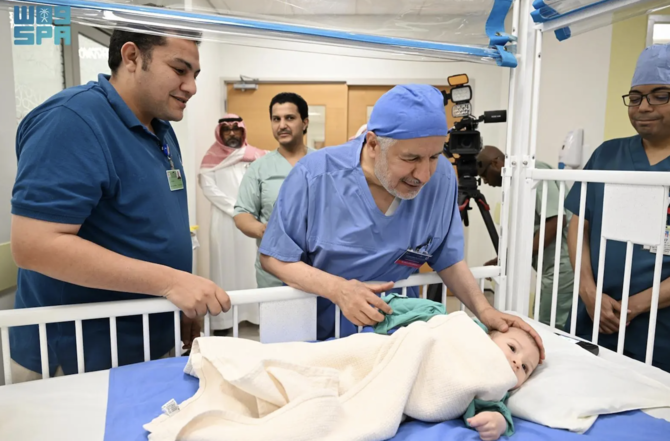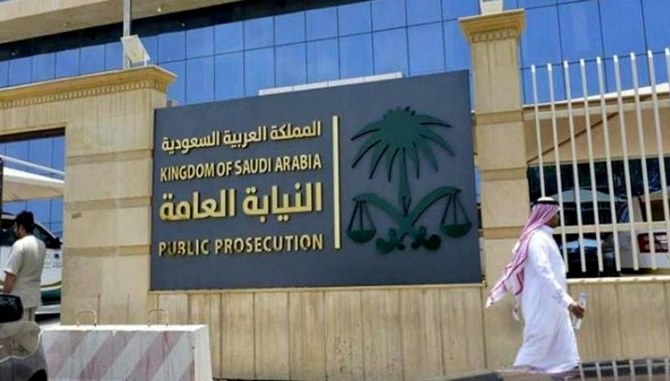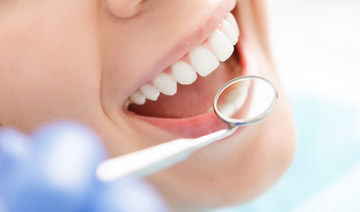RIYADH: Saudi Arabia’s Public Prosecution said on Monday that spreading rumors or lies about any matter “related to public order” is considered a serious crime in the Kingdom and anyone caught doing so faces arrest and tough penalties.
The authority added that in accordance with the Law on Combating Information Crimes and the Law of Criminal Procedures, this includes individuals who promote or participate in spreading false information in any form on social media, especially fabrications that originate from hostile sources in other countries.
The Public Prosecution said that while monitoring accounts on social-networking sites it had found some that were creating or spreading baseless rumors about a Riyadh Season music event that had been postponed. The false information was coordinated and supported by external, hostile parties who were responsible for most of the posts, the authority added.
It added that individuals in the Kingdom who had participated in spreading the rumors had been “summoned” and criminal charges are being brought against them.
“These actions result in heavy penalties of up to five years imprisonment and a fine of SR3 million ($800,000),” the Public Prosecution said. In addition, devices and tools used to commit such crimes will be confiscated, the final ruling is made public and action can be taken against anyone who incited, assisted or agreed to commit the crime, the authority added.
It urged all citizens and residents to obtain information only from official sources and not to engage with rumors on social media. Those who fail to heed the warning risk facing the maximum penalties prescribed by law, it added.
Saudi Public Prosecution warns of harsh penalties for spreading rumors
https://arab.news/gjyxj
Saudi Public Prosecution warns of harsh penalties for spreading rumors

- Anybody caught making false statements about matters ‘related to public order’ face up to five years in jail and a SR3 million fine
- This includes anyone who spreads false information on social media, especially lies that originate from hostile sources in other countries
Call for Saudis to join national AI training

RIYADH: The Saudi Data and AI Authority, in collaboration with the education and human resources and social development ministries, has invited citizens to register for the national initiative, “One Million Saudis in AI – SAMAI.”
The initiative, which is taking place for the first time, aims to train 1 million Saudis in artificial intelligence to strengthen national capabilities in line with Vision 2030, the Saudi Press Agency reported on Wednesday.
It will provide trainees with skills and knowledge in data and AI technologies, their applications and ethics, and practical training on the tools needed to integrate AI into business and daily life.
The initiative aligns with the Kingdom’s goal of becoming a global leader in technology and innovation while empowering citizens in advanced fields, according to the SPA.
The authority and ministries are encouraging citizens from all backgrounds to register at samai.futurex.sa/.
Red Sea International Film Festival opens for 2025 submissions

- Saudi, Arab, Africa, Asia entrants eligible to enter by Aug. 17
- Festival has shown 520 films from 85 nations, says official
JEDDAH: The Red Sea International Film Festival has opened its submissions portal for its fifth edition, which will run from Dec. 4 to 13 in the historic district of Al-Balad, Jeddah.
Filmmakers from Saudi Arabia, other countries in the Arab world, Africa and Asia have until Aug. 17 to submit their entries.
There will be no fee for entries submitted before July 7, after which a fee will apply: SR100 ($26) for short films and SR200 for feature films.
Submissions can be entered under three categories: the Red Sea Competition, Red Sea Shorts Competition and New Saudi/New Cinema.
The Red Sea Competition highlights outstanding works from Asia and Africa, including the Arab world, across narrative, documentary and animation.
The Shorts Competition showcases films under 60 minutes, focusing on original storytelling.
The New Saudi/New Cinema section focuses on emerging local talent, offering a platform for new voices in the Kingdom’s rapidly growing film scene.
Since its inception in 2019, the festival has served as a platform for cultural dialogue and cinematic discovery, while strengthening ties between regional and international filmmakers.
Selected films this year will vie for the prestigious Yusr Awards, including the Golden Yusr for Best Feature Film, which comes with a $100,000 prize. Other accolades include Best Director, the Jury Prize and the Golden Yusr for Best Short Film.
Shivani Pandya Malhotra, managing director of the Red Sea Film Foundation, said in a statement the festival has “firmly established itself as a distinctive force within the cinematic landscape, both locally and internationally.”
“Having showcased over 520 films from 85 countries, the festival stands today as a vital platform for cultural exchange and compelling storytelling,” she added.
Saudi Arabia showcases defense innovation at Athens expo

- Saudi pavilion highlights advanced systems, strategic ties and investment potential
RIYADH: Saudi Arabia is taking part for the first time in the Athens International Defense and Security Exhibition in Greece, held from May 6-8.
The Saudi pavilion is organized by the General Authority for Military Industries, with contributions from the General Authority for Defense Development and Saudi Arabian Military Industries.
The opening was attended by Ahmad Al-Ohali, governor of the General Authority for Military Industries; Lt. Gen. Fahd Al-Juhani, chief of staff of the Royal Saudi Land Forces; and Muhannad Al-Basrawi, charge d’affaires at the Saudi Embassy in Greece.
Al-Ohali and other officials toured the Saudi pavilion and were briefed on the advanced defense and security technologies on display.
The pavilion highlights the progress of Saudi military industries and growing national defense capabilities. It also showcases strategic partnerships aimed at enhancing international cooperation and localizing defense technologies.
Al-Ohali said that the Kingdom’s presence reflects its strategic position in military industries, its attractive investment environment and its efforts to localize more than 50 percent of military spending under the Vision 2030 reform plan.
The pavilion showcases Saudi Arabia’s defense industry ecosystem, including policies, regulations, national priorities and investor incentives. It also presents streamlined business processes, key achievements and major initiatives in the defense sector.
Participating countries and international companies are showcasing their latest systems in land, naval and aerial defense, as well as cybersecurity solutions.
The Saudi preence comes amid rapidly growing Saudi-Greek relations across multiple sectors, reflecting the strength of their strategic partnership — particularly in defense, where both countries share a common vision for regional security, stability and technological collaboration.
Saudi medical team begins to separate Egyptian conjoined twins

- Most delicate case ever undertaken by his team, says surgeon Dr. Abdullah Al-Rabeeah
DUBAI: A medical team of the Saudi Conjoined Twins Program began on Wednesday to separate Egyptian twins at King Abdullah Specialist Children’s Hospital in Riyadh.
Dr. Abdullah Al-Rabeeah, advisor at the royal court and supervisor general of the Kingdom’s aid agency KSrelief, who heads the team, said the twins are joined at the back, lower chest, abdomen and pelvis, the Saudi Press Agency reported.
One of the twins lacks essential organs, including a heart and head, and suffers from severe congenital defects, making survival impossible.
The complex operation is expected to last approximately 11 hours and will proceed in six stages.
It involves a multidisciplinary team of 26 consultants, specialists, and support staff in fields including anesthesia, neurosurgery, pediatric surgery, and plastic surgery.
Al-Rabeeah described the case as one of the most delicate the team has undertaken, noting the shared spinal canal as a major surgical challenge.
Advanced imaging and surgical microscopes will be used to ensure precision, he said.
This marks the 63rd separation procedure under the Saudi Conjoined Twins Program, which has reviewed 149 cases from 27 countries since its inception in 1990.
What’s the matcha with everyone? The beloved green tea powder hits mainstream in Saudi Arabia

- The Japanese tea’s rise in the Kingdom is a cultural shift, one green cup at a time
RIYADH: Once a niche ceremonial tea in Japan, matcha is now gaining mainstream popularity in Saudi Arabia, thanks to a growing interest in wellness trends, evolving taste preferences, and the rise of mindful living.
The data backs the trend. According to a recent report by IMARC Group, Saudi Arabia’s green tea market, which includes matcha, was valued at $140.14 million and is projected to grow to $229.24 million by 2033.
Imports of packaged green tea nearly doubled in value between 2020 and 2023, suggesting a growing appetite for premium, health-focused drinks.
That growing demand is reflected on cafe menus and social media feeds across the Kingdom. Matcha lattes, once limited to specialty coffee shops, are now a fixture at trendy cafes and home kitchens alike.
Whether it’s served iced in sleek glass cups or whisked at home with oat milk, matcha is more than a drink. It’s a mood, a personal statement, and for many, a healthier way to start the day.
In Dammam, 19-year-old Sara Anas remembers her first taste of matcha back in 2019. “My dad likes trying new things,” she said. “It didn’t taste that great at first, but when matcha became popular in 2021, I got excited to try it again from local cafes.”
Now, she drinks it almost daily. “It might sound strange, but I don’t feel like it’s heavy on my body like coffee. It makes me feel more relaxed and gives me energy in a better way.”
Anas is part of a growing demographic. In Riyadh, 26-year-old Amal Al-Mutairi starts every morning with matcha. “I prefer it iced with vanilla milk to make the flavor smoother and lighter,” she said.
For her, the appeal began with reading about its benefits. “It gives me calm energy without the jitters or crash I usually feel after drinking coffee. It also helps me focus for longer periods.”
That calm, focused energy — often described as a “cleaner” caffeine experience — has made matcha especially popular among students and professionals.
For Anas, it’s a campus essential. “It’s a must before classes! It gives me the energy to continue my day at uni,” she said.
But matcha is more than functional. It’s become a lifestyle, embraced for both its wellness claims and its visual charm.
Globally, matcha’s rise is part of a broader wellness boom. Japan’s matcha production rose 185 percent from 2010 to 2023, and demand is now so high that suppliers are warning of shortages. Japan’s top growers have begun limiting exports to meet domestic needs.
Matcha’s health appeal is not just hype. Rich in antioxidants — especially a compound called EGCG — studies suggest it may reduce inflammation, support cardiovascular health, and aid cognitive function.
A recent Saudi study also found that over half of the participants believed matcha could help with weight management and blood sugar balance.
Still, experts note that moderation matters. Excessive matcha consumption may interfere with iron absorption and isn’t recommended for everyone.
The ritual of preparing matcha, especially for those who make it themselves, has become part of a broader shift toward slow, intentional living — something many young Saudis are leaning into.
That ritual is deeply personal for 27-year-old Leen Al-Zamil, who turned matcha from curiosity into a daily indulgence. “I was curious at first and honestly, I hated it so much, but I think (that’s) because it was hot,” she said. “I liked it cold with vanilla syrup and oat milk. I definitely can’t drink it alone.”
Now, she can’t go a day without it. “Sometimes twice or more,” she said. “I like its color … I enjoy every step of making it, and it just tastes so good. It brightens my mood.”
Al-Zamil is not the only one who sees matcha as more than just a drink.
For 28-year-old Mona Abdullah, matcha represents healing. “As someone who suffers from IBS, coffee tends to affect me for a while, whereas matcha provides steady energy without causing any discomfort,” she said. “I’ve stopped drinking coffee for the past three months. I now believe that matcha is a better source of caffeine compared to black coffee.”
Irritable bowel syndrome is a common digestive condition. Many people with IBS find that coffee, with its acidity and high caffeine content, can trigger discomfort, making gentler alternatives like matcha a preferred choice.
Abdullah drinks it twice a day, iced, and without any added flavors. “Health,” she says, is what made her switch.
Still, matcha’s appeal goes beyond health — it’s also about aesthetics and culture. “I think it’s a mix of everything,” said Al-Mutairi. “The health benefits, the taste, and yes, the aesthetic.”
Anas echoed that idea, noting that people’s motivations vary. “For me, it’s for its health benefits and for the taste. You don’t usually get a healthy drink with a good taste,” she said. “But I think there are a lot of people who drink it just for the aesthetic. You see them adding hundreds of syrups just to say they drink matcha.”
That blend of wellness and image — serious health meets playful branding — has fueled matcha’s surge on social media. With its bright green hue, minimalist packaging, and frequent cameos in cafe selfies, matcha has become the drink of the “soft life” movement, one that prioritizes peace, balance, and pleasure.
“It’s definitely the vibe and the taste,” said Al-Zamil.
In a country where coffee culture runs deep, matcha is not replacing tradition; it’s offering something new: a blend of taste, lifestyle, and personal meaning, one bright green cup at a time.


















